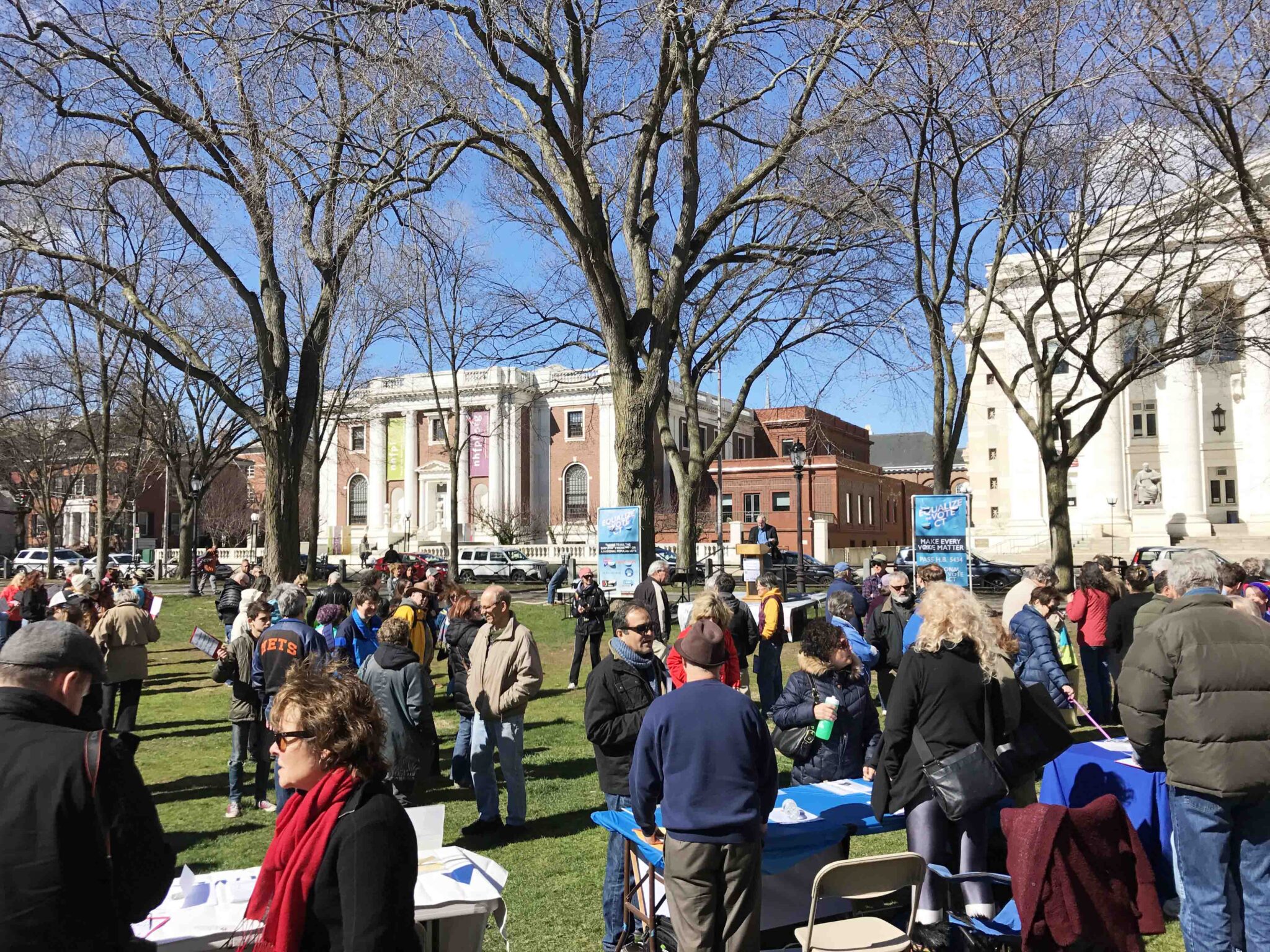
Sen. Richard Blumenthal LAW ’73, D-Conn., and Mayor Toni Harp spoke Saturday in favor of replacing the Electoral College with the national popular vote for future presidential elections at a rally on the Green organized by National Popular Vote Compact Connecticut, a popular vote advocacy group.
The event, which about 100 people attended, featured speeches by organizers, activists and politicians from all levels of government. Speakers railed against the Electoral College, calling it undemocratic, and cited the 2016 presidential election as evidence of the need for change. In his address, Blumenthal said he was heartened by the enthusiasm of those present but stressed the importance of turning this enthusiasm into action.
“As a citizen of Connecticut, I’m going to do what I think every one of us should do,” Blumenthal said. “I’m calling my state representative.”
Blumenthal noted that Connecticut is one of only four states in the Northeast that has not passed legislation committing the state to the National Popular Vote Interstate Compact, an agreement between 10 states and the District of Columbia in which member states pledge to award their electoral votes to the presidential candidate who wins the national popular vote. If adopted by enough states such that the total number of electoral votes bound by the compact numbered 270 or more, the plan would effectively institute a national popular vote without the need for a constitutional amendment.
Together, the current members of the compact have 165 electoral votes, or 61 percent of the votes necessary to successfully implement the plan. New York and California, two of the three states with the most electors, have joined the NPVIC.
In the Connecticut General Assembly, the Government Administration and Elections Committee is considering legislation to join the compact. Lawmaker’s attitudes toward the proposal are split largely along partisan lines, with Democrats supporting the measure and Republicans opposing it. In the Senate, the Democrats and Republicans are tied, while in the House the Democrats have a 79–72 majority.
In her address, Harp noted that under the current system, votes in swing states have more bearing on the outcome of the election than votes in red and blue states. Adopting the popular vote would restore equality between voters, she said.
“With one person, one vote, there would be no more swing states,” Harp said. “In this way, the value of each individual vote, yours and mine, would be restored.”
Although the NPVIC has been raised in the state legislature a number of times over the past few years, popular vote advocates have committed themselves to the issue with new vigor after the 2016 presidential election, in which Hillary Clinton LAW ’73 lost the Electoral College despite her nearly 3-million-vote advantage in the popular vote.
Saturday’s rally was organized by National Popular Vote Compact CT, a grass-roots group that sprung up after the election to push for Connecticut to join the NPVIC. Since November, the group has held a number of forums as well as a rally and press conference, according to Steven Winter, one of the group’s lead organizers.
Although Connecticut held just seven electoral votes in the 2016 election, Winter said he thinks decisive action in the Nutmeg State could sway other states on the cusp of signing on to the compact.
“There’s a lot of momentum behind this proposal, and we feel like it’s really important for Connecticut to send a message to the nation that twice in 16 years is way too many times for the national popular vote loser to become the president,” Winter said. “States like Oregon, Minnesota, Colorado — these are states that have a reputation for good government … and I think if they saw Connecticut setting an example, they would be interested in joining in as well.”
Chester resident and longtime popular vote advocate Marta Daniels came to the Green Saturday as a representative of the Chester Democratic Town Committee, one of the rally’s co-sponsors. Over the past few months, she said, Chester Democrats have made fact sheets and distributed thousands of flyers urging residents to support the push for the popular vote.
For Daniels, the NPVIC represents a way to fight back against gerrymandering and other forms of voter suppression.
“The national popular vote is an antidote to the repression,” she said. “It’s an antidote to authoritarianism. And we hope that our state will step up because it’s a completely legal and constitutional action that they’re going to take if they pass the NPV compact.”
Sharon Farmer, a Burlington, Connecticut resident who made signs for the event, said she supported the compact because she sees the Electoral College as obsolete. She explained that the original purpose of the Electoral College system was to vet candidates who are either unqualified or disloyal to the country. But Trump, who Farmer said she believes is unqualified and has colluded with the Russian government, had just been elected via the system. She said this proves that the college no longer serves its original purpose.
In November, Donald Trump became the fourth president to win the Electoral College while losing the national popular vote, and the second in the past five presidential elections.







